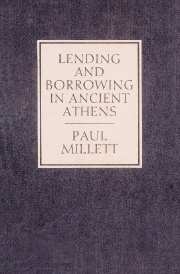Book contents
- Frontmatter
- Contents
- Preface
- I Approaches to lending and borrowing
- II The ideology of lending and borrowing
- III Borrowing and repayment
- IV The rôle of interest
- V Philia and friendship
- VI Non-professional lending: loans without interest
- VII Non-professional lending: loans bearing interest
- VIII Professional money-lending
- IX Conclusion
- Appendices
- Notes
- Bibliography
- Index of passages cited
- Index of papyri
- Index of inscriptions
- General index
II - The ideology of lending and borrowing
Published online by Cambridge University Press: 20 August 2009
- Frontmatter
- Contents
- Preface
- I Approaches to lending and borrowing
- II The ideology of lending and borrowing
- III Borrowing and repayment
- IV The rôle of interest
- V Philia and friendship
- VI Non-professional lending: loans without interest
- VII Non-professional lending: loans bearing interest
- VIII Professional money-lending
- IX Conclusion
- Appendices
- Notes
- Bibliography
- Index of passages cited
- Index of papyri
- Index of inscriptions
- General index
Summary
THE CASE AGAINST STEPHANUS
In the previous chapter (p. 9), it was explained how our exceptionally detailed knowledge of the bank of Pasion derived from a series of law-court speeches. Half of these speeches (Dem. xxxvi, xlv and [xlvi]) were the fruit of litigation by Pasion's son, Apollodorus, trying to recover monies which he claimed had been embezzled by his father's associate, Phormion. Our immediate concern is with a passage from one of these speeches; but, as both Phormion and Apollodorus will reappear throughout this study, some detail about their relationship may prove helpful.
Pasion began his career in the later fifth century as the slave of Antisthenes and Archestratus, who ran one of the earliest banks known in Athens. At some date around 400 Pasion was given his freedom and, by a process not clear to us, gained control of the bank. The business flourished and Pasion deployed his wealth wisely, so that some time after c. 390 he became an Athenian citizen. Shortly before his death in 370/69, he retired from active involvement in banking; the bank, and also a workshop making shields, were rented to Phormion, his former slave and assistant. The career of Phormion turned out to be no less remarkable than that of Pasion. Not only did he receive his freedom: according to the terms of Pasion's will he was to marry his master's widow, receiving a dowry of five talents. He was also to act as guardian to Pasion's younger son Pasicles; the elder son, Apollodorus, had already come of age. In this capacity, Phormion retained control of both bank and shield manufactory for approximately eight years, paying over an annual rent.
- Type
- Chapter
- Information
- Lending and Borrowing in Ancient Athens , pp. 24 - 52Publisher: Cambridge University PressPrint publication year: 1991

